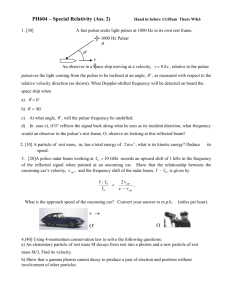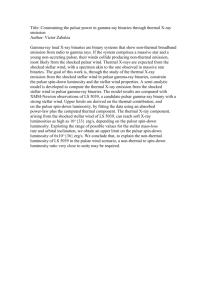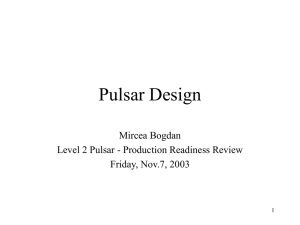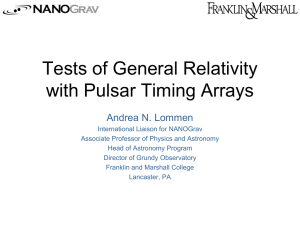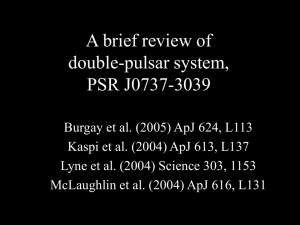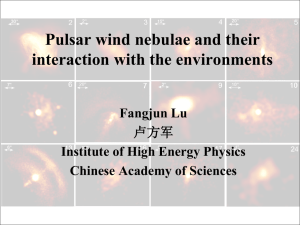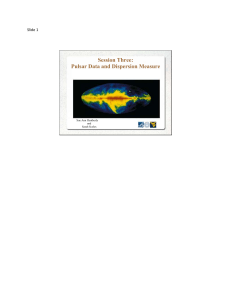Presentation - Chandra X
advertisement
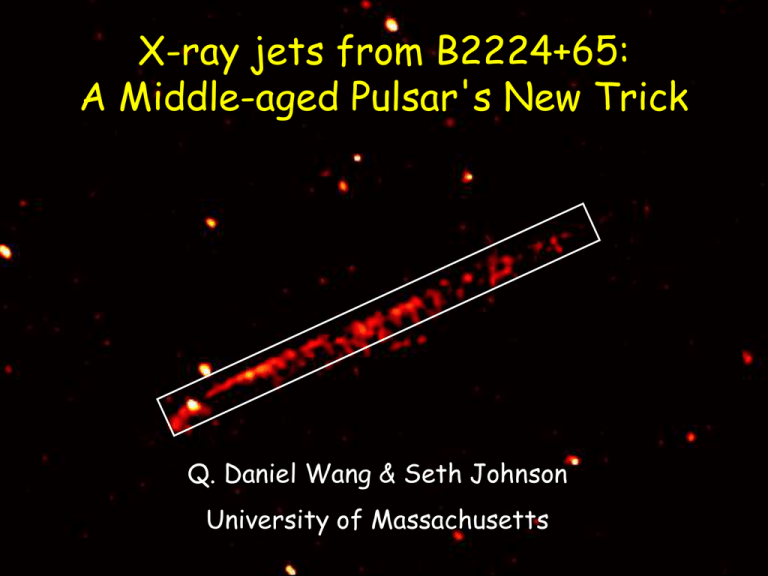
X-ray jets from B2224+65: A Middle-aged Pulsar's New Trick Q. Daniel Wang & Seth Johnson University of Massachusetts B2224+65 and Guitar Nebula Pulsar proper motion direction Image: Courtesy of Shami Chatterjee and James M. Cordes Cornell University • • • • • • Period = 0.68 s Ės =1.2 x 1033 erg s−1 ts ~ 1.1 Myr Distance ~ 1 kpc Proper motion ~ 900 km/s A bow shock nebula in Hα (Cordes et al. 1993). • A linear X-ray feature apparently stemming from pulsar, but ∼118o offset from its proper motion direction (Wong et al. 2003; Zavlin & Pavlov 2004; Hui & Becker 2007). • This linear feature (main jet) showing a consistent proper motion (Johnson & Wang 2010). Three epoch Chandra/ACIS-S observations 1 0 " 1 0 " Reference line pulsar 2000 48 ks 2006 45 ks (A) 1 0 " (B) 1 0 " 10" Elongation due to pulsar motion 2012 87 ks (C) Combined in Combined 189frame ks (D) pulsar rest 10" Jet Counter Jet Combined in pulsar rest frame Intensity (10-2 counts s-1 arcmin-2) Trail Azimuthal intensity plot; angle E from N Away from pulsar’s motion 1.0 Counter jet Trail jet 0.1 0 100 200 Angle (degree) 300 • Consistent proper motions of the pulsar and the main jet. • Sharp leading edges of the jets, slightly bended backward. • A gap between the pulsar and the main jet. • Broadening with the distance from the pulsar. Spectral characteristics 1’ 0.7-1.5 (red), 1.5-3 (green), 3-7 (blue) keV • No systematic variation in the spectral shape with time or across the main jet. • Flat spectrum with a power law photon index 1.2 (0.9-1.5; 90% error interval), compared to 1.7 (1.3-2.0) for the pulsar. • Thus the jet is not simply due to the diffusion of particles from the pulsar or its bow shock. • In-situ particle acceleration in the jets is required and probably at the emission peaks, which tend to be spectrally harder. Implications • The results are most intuitively explained by ballistic ejecting jets, similar to those seen in AGNs. • The straightness of the main jet, under the expected large ram-pressure of the ISM, indicates that it is largely hadronic. • The intensity contrast between the two jets requires a strong Doppler effect and predicts their nearly orthogonal direction relative to the pulsar motion. • This orientation of the spin (jets) and the large pulsar velocity may be due to a fast kick in an asymmetric SN. • The scenario can be tested by a radio polarization measurement of the pulsar. • The energetic jet-like ejection may be a common phenomenon of pulsars and may be an important source of cosmic-rays. Examples of other similar linear X-ray features SNR MSH 11-61A An example of linear nonthermal X-ray filaments as candidates (Wang et al. 2002). The jet, >11 pc long, displays a helical shape and propagates nearly perpendicular to the pulsar motion (Pavan et al. 2014). 37:00.0 65:36:00.0 30.0 37:00.0 30.0 0.022 45.0 0.026 40.0 0.034 35.0 25:30.0 0.049 22:26:00.0 0.081 55.0 0.14 50.0 45.0 0.27 40.0 0.52 35:00.0 50.0 30.0 65:36:00.0 30.0 .02 55.0 35:00.0 22:26:00.0 35.0 25:30.0 1 2
